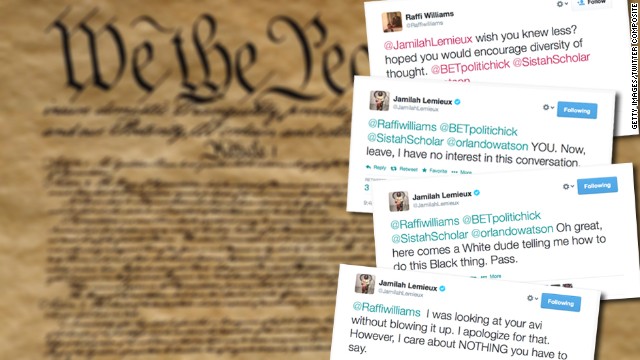What does diversity of thought mean to you?
Different perspectives…there is more-than-one-way…variation in approach…a new angle…Hmm, I would have never thought of that.
Do you merely tolerate it for the sake of your professional career? Are you somewhat open to it? Or do you truly embrace it?
A colleague turned me on to a Youtube video of a TEDx talk; where a liberal African-American man creates a fake alt-right profile online to see what content he would be served up by the multitude of social media algorithms. He wasn’t surprised by the content that each site said might appeal to a person of his “interests” and “tastes.” But it raises a terrifying point when it comes to exploring and cultivating diversity of thought. It’s a point I’ve actually written about before. With increasing frequency, mathematical equations are starting to make decisions for us — what we see, what we read, sites to visit, even people to follow or like. It’s called the echo chamber. From our good friends at Wikipedia:
An echo chamber is a metaphorical description of a situation in which information, ideas, or beliefs are amplified or reinforced by communication and repetition inside a defined system. Inside a figurative echo chamber, official sources often go unquestioned and different or competing views are censored, disallowed, or otherwise underrepresented.
I attended a conference last week, at which a keynote speaker from TD Ameritrade (a young woman who was their resident tech guru) talked about how well Facebook “knows” you based on how many things you “like” on their site. A joint study between Stanford and the University of Cambridge found that, based on a 100-question personality survey with five key traits (openness, conscientiousness, extraversion, agreeableness, and neuroticism):
- With just 10 “likes,” Facebook knows you better than your colleagues do
- With 150 “likes,” Facebook knows you better than your family does
- With 300 “likes,” Facebook knows you better than your spouse does
- And after [what I think was 500 or 1,000 likes, I can’t find the number to confirm and they didn’t include the slides in the conference app] Facebook knows you better than you know yourself.
Read about it:
https://www.wired.com/2015/01/facebook-personality-test/
The shocking details you reveal about yourself when you ‘like’ things on Facebook – MarketWatch
https://www.nytimes.com/2015/01/20/science/facebook-knows-you-better-than-anyone-else.html
The TEDx speaker goes on to advocate for an interpersonal revolution. To stop hiding behind the anonymity of the internet and start talking to people. Even if you don’t agree…even if there are tough conversations to be had…it has to be done. Community leaders and organizations need to promote and encourage in-person, constructive dialogue.
Or we’ll all just start retreating into our own private echo chambers.
__________________________________________________________________________________
As so often happens at some point before bed on Sunday night, CBS Sunday Morning was watched in our house this week. One segment was about the recent trend to tear down Confederate statues in the wake of the awful events from Charlottesville. A trend that actually gained steam initially after the Church shooting in Charleston (which feels like eons ago at this point, but alas, was only just over two years ago).
To be clear, I’m addressing this topic NOT to debate the merits of tearing down statues. I’m addressing it because the CBS segment celebrates the very same diversity of thought issue that was at the epicenter of Charlottesville.
The segment centered on a stained glass window in Roanoke’s Fifth Avenue Presbyterian Church. More specifically, Stonewall Jackson’s inclusion in that stained glass window. And how Jackson has managed to maintain his presence in that window, despite the fact that the entire congregation is black. I’ll let CBS tell you the story:
…Third-generation member Joyce Bolden says the window is not about General Jackson, but Jackson, the man, who before the war led a bible study for his slaves — including the parents of an early pastor. “This was a monument to the future of the African American race.” “I believe it’s being memorialized. Stonewall Jackson was as a human being and as a man of Christ, of faith. He defied all the laws of the South by educating his slaves. He taught them to read and write.”
“We need to remember this nation exists by the blood and the sacrifice and the courage of many, many men,” Virginia Tech history professor emeritus James Robertson said. “Many guided correctly, many misguided.” Robertson isn’t new to this debate. In 1961, President Kennedy tapped Robertson to lead the Civil War Centennial Commission.
“We need to learn from the mistakes others made, just as well as we need to be inspired by the good things that good people have done,” Robertson said.
And he believes there was a lot of good in Confederate Gen. Robert E. Lee.
“He is the most unobjectionable of all Confederate leaders,” Robertson said. “But people forget that after the Civil War, Lee became the greatest voice for reconciliation in this country. He preached peace and harmony.”
And the segment concluded:
“So when I die off, and there’s no memory of the origins of this window, it probably will be removed,” Bolden said.
Until that day, she sees that window not as a tribute to the Confederacy, but as a connection to her own past and a church she loves.
______________________________________________________________________________________
Do we celebrate our past? Run from it? Be beholden to it? Learn from it? All of the above?
What about the nation’s triumphs? Are they to be celebrated unilaterally?
Along with the recent Confederate statue swirl, questions like this wandered in and out of my mind over Labor Day weekend. We, along with my cousins, took our collective five kids to the National Air and Space Museum near Dulles Airport—formally named the NASM’s Steven F. Udvar-Hazy Center.
Highly recommended.
There they have an SR-71 Blackbird…a Mach 3+ aircraft that once made the cross-country flight from Los Angeles to Washington D.C. in 1 hour and 4 minutes.

They have one of the Concordes.

They have the space shuttle Discovery.

In addition to dozens of other missiles, rockets, satellites, lunar modules, and helicopters.
And tucked in amongst a bevy of smaller planes, they had this one.

Up until now, whenever the name Enola Gay was mentioned, it was either part of a trivia game I was playing, or something that older generations were talking about at family gatherings (my mom was born three days after the bombing of Pearl Harbor, so WWII conversations came up every so often).
But still, standing there staring at it, I wasn’t sure how to feel. Awe-struck…proud…sad…guilty. It was almost as if I wanted to look around to see if anyone else saw me standing there staring at it.
The bomb dropped from that plane killed an estimated 70,000 people in one day, and tens of thousands more when you consider injury and radiation. By way of comparison, the total number of deaths on September 11, 2001, was 2,996.
_________________________________________________________________________________________
It has been said that history is always written by the winners. When two cultures clash, the loser is obliterated, and the winner writes the history books–books which glorify their own cause and disparage the conquered foe.
It’s important for us, in these echo chamber times, to hold diversity of thought closer than ever before. Listen to the winners and the losers.
There are always two sides to every story.
(Take the American Revolution, for example. Which, outside of the U.S. is taught as nothing more than an after-thought to the Renaissance and French Revolution.)
It doesn’t matter the catalyst: Confederate statues, World Wars, political leanings.
Be tolerant.
Not every perspective is a moral one, or just one.
But there are a lot of good points of view out there if we take the time and listen to all of them.


